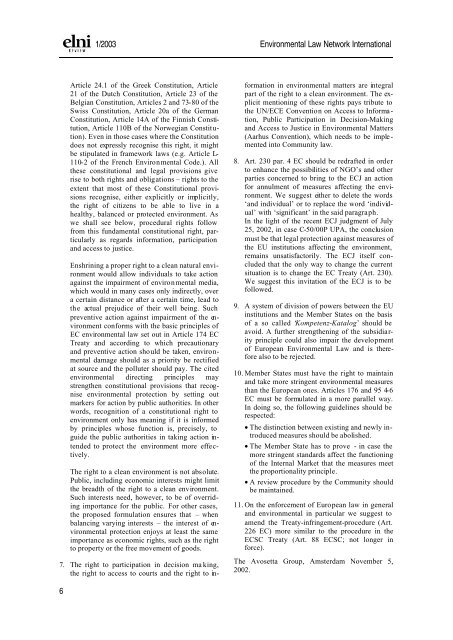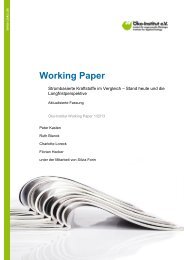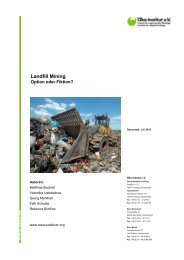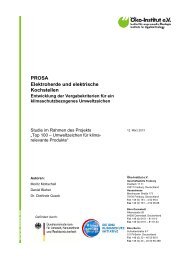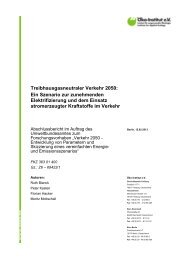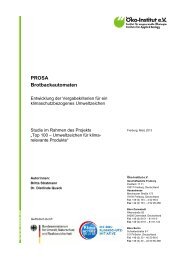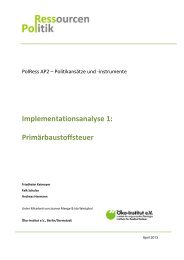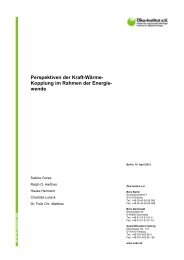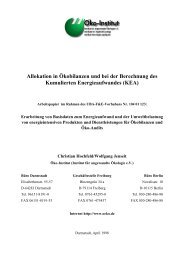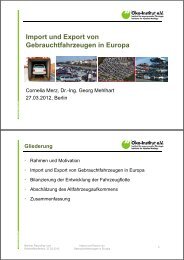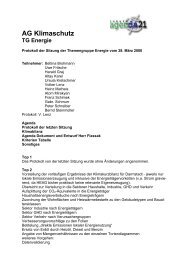elni NEWS - Öko-Institut eV
elni NEWS - Öko-Institut eV
elni NEWS - Öko-Institut eV
Create successful ePaper yourself
Turn your PDF publications into a flip-book with our unique Google optimized e-Paper software.
6<br />
1/2003 Environmental Law Network International<br />
Article 24.1 of the Greek Constitution, Article<br />
21 of the Dutch Constitution, Article 23 of the<br />
Belgian Constitution, Articles 2 and 73-80 of the<br />
Swiss Constitution, Article 20a of the German<br />
Constitution, Article 14A of the Finnish Constitution,<br />
Article 110B of the Norwegian Constitution).<br />
Even in those cases where the Constitution<br />
does not expressly recognise this right, it might<br />
be stipulated in framework laws (e.g. Article L-<br />
110-2 of the French Environmental Code.). All<br />
these constitutional and legal provisions give<br />
rise to both rights and obligations – rights to the<br />
extent that most of these Constitutional provisions<br />
recognise, either explicitly or implicitly,<br />
the right of citizens to be able to live in a<br />
healthy, balanced or protected environment. As<br />
we shall see below, procedural rights follow<br />
from this fundamental constitutional right, particularly<br />
as regards information, participation<br />
and access to justice.<br />
Enshrining a proper right to a clean natural environment<br />
would allow individuals to take action<br />
against the impairment of environmental media,<br />
which would in many cases only indirectly, over<br />
a certain distance or after a certain time, lead to<br />
the actual prejudice of their well being. Such<br />
preventive action against impairment of the environment<br />
conforms with the basic principles of<br />
EC environmental law set out in Article 174 EC<br />
Treaty and according to which precautionary<br />
and preventive action should be taken, environmental<br />
damage should as a priority be rectified<br />
at source and the polluter should pay. The cited<br />
environmental directing principles may<br />
strengthen constitutional provisions that recognise<br />
environmental protection by setting out<br />
markers for action by public authorities. In other<br />
words, recognition of a constitutional right to<br />
environment only has meaning if it is informed<br />
by principles whose function is, precisely, to<br />
guide the public authorities in taking action intended<br />
to protect the environment more effectively.<br />
The right to a clean environment is not absolute.<br />
Public, including economic interests might limit<br />
the breadth of the right to a clean environment.<br />
Such interests need, however, to be of overriding<br />
importance for the public. For other cases,<br />
the proposed formulation ensures that – when<br />
balancing varying interests – the interest of environmental<br />
protection enjoys at least the same<br />
importance as economic rights, such as the right<br />
to property or the free movement of goods.<br />
7. The right to participation in decision ma king,<br />
the right to access to courts and the right to in-<br />
formation in environmental matters are integral<br />
part of the right to a clean environment. The explicit<br />
mentioning of these rights pays tribute to<br />
the UN/ECE Convention on Access to Information,<br />
Public Participation in Decision-Making<br />
and Access to Justice in Environmental Matters<br />
(Aarhus Convention), which needs to be implemented<br />
into Community law.<br />
8. Art. 230 par. 4 EC should be redrafted in order<br />
to enhance the possibilities of NGO’s and other<br />
parties concerned to bring to the ECJ an action<br />
for annulment of measures affecting the environment.<br />
We suggest either to delete the words<br />
‘and individual’ or to replace the word ‘individual’<br />
with ‘significant’ in the said paragraph.<br />
In the light of the recent ECJ judgment of July<br />
25, 2002, in case C-50/00P UPA, the conclusion<br />
must be that legal protection against measures of<br />
the EU institutions affecting the environment,<br />
remains unsatisfactorily. The ECJ itself concluded<br />
that the only way to change the current<br />
situation is to change the EC Treaty (Art. 230).<br />
We suggest this invitation of the ECJ is to be<br />
followed.<br />
9. A system of division of powers between the EU<br />
institutions and the Member States on the basis<br />
of a so called ‘Kompetenz-Katalog’ should be<br />
avoid. A further strengthening of the subsidiarity<br />
principle could also impair the development<br />
of European Environmental Law and is therefore<br />
also to be rejected.<br />
10. Member States must have the right to maintain<br />
and take more stringent environmental measures<br />
than the European ones. Articles 176 and 95 4-6<br />
EC must be formulated in a more parallel way.<br />
In doing so, the following guidelines should be<br />
respected:<br />
• The distinction between existing and newly introduced<br />
measures should be abolished.<br />
• The Member State has to prove - in case the<br />
more stringent standards affect the functioning<br />
of the Internal Market that the measures meet<br />
the proportionality principle.<br />
• A review procedure by the Community should<br />
be maintained.<br />
11. On the enforcement of European law in general<br />
and environmental in particular we suggest to<br />
amend the Treaty-infringement-procedure (Art.<br />
226 EC) more similar to the procedure in the<br />
ECSC Treaty (Art. 88 ECSC; not longer in<br />
force).<br />
The Avosetta Group, Amsterdam November 5,<br />
2002.


